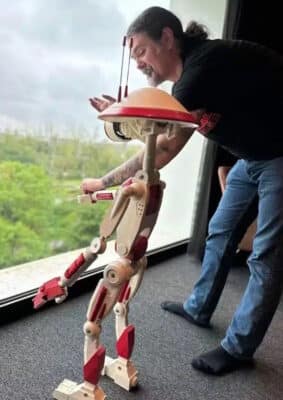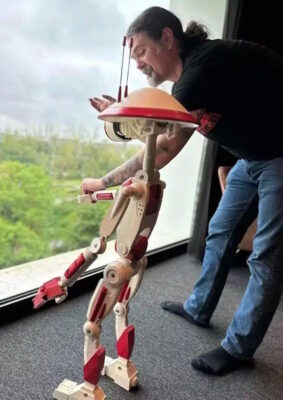Outside the glare of the klieg lights that ChatGPT commanded this year, a troupe of autonomous machines nudged the frontiers of robotics forward.
Here are six that showed special prowess — swimming, diving, gripping, seeing, strolling and flying through 2023.
A Media Darling at CES
Ella — a smart stroller from startup Glüxkind Technologies, of Vancouver, Canada — kicked off the year when it was named an honoree in the CES 2023 Innovation Awards.
The canny carriage uses computer vision running on the NVIDIA Jetson edge AI platform to follow parents. Its AI-powered abilities, like smart braking and a rock-my-baby mode, captured the attention of media outlets like Good Morning America and The Times of London as well as an NVIDIA AI Podcast interview with its husband-and-wife cofounders.
A member of NVIDIA Inception, a free program for cutting-edge startups, Glüxkind was one of seven companies with NVIDIA-powered products recognized at the Las Vegas event in January. They included:
- John Deere for its fully autonomous tractor,
- AGRIST for its robot that automatically harvests bell peppers,
- Inception member Skydio for its drone that can fly at a set distance and height without manual intervention,
- Neubility, another Inception member, for its self-driving delivery robot,
- Seoul Robotics, a partner in the NVIDIA Metropolis vision AI software, for its Level 5 Control Tower that can turn standard vehicles into self-driving cars, and
- WHILL for its one-person vehicle that automatically guides a user inside places like airports or hospitals.
Dexterous Food Packer
Inception startup Soft Robotics, of Bedford, Mass., introduced its mGripAI system to an $8 trillion food industry hungry for automation. It combines 3D vision and AI to grasp delicate items such as chicken wings, attracting investors that include Tyson Foods and Johnsonville.
Soft Robotics uses the NVIDIA Omniverse platform and NVIDIA Isaac Sim robotics simulator to create 3D renderings of chicken parts on conveyor belts or in bins. With help from AI and the ray-tracing capabilities of NVIDIA RTX technology, they help the robot gripper handle as many as 100 picks per minute, even under glare or changing light conditions.
“We’re all in on Omniverse and Isaac Sim, and that’s been working great for us,” David Weatherwax, senior director of software engineering at Soft Robotics, said in a January interview.
A Keen Eye in the Factory
In a very different example of industrial digitalization, leading electronics manufacturer Quanta is inspecting the quality of its products using the TM25S, an AI-enabled robot from its subsidiary, Techman Robot.
Using Omniverse, Techman built a digital twin of the inspection robot — as well as the product to be inspected — in Isaac Sim. Programming the robot in simulation reduced time spent on the task by over 70%, compared to programming manually on the real robot.
Then, with powerful optimization tools in Isaac Sim, Techman explored a massive number of program options in parallel on NVIDIA GPUs. The end result, shown in the video below, was an efficient solution that reduced the cycle time of each inspection by 20%.
Sailing the Seas for Data Science
For its part, Saildrone, an Inception startup in Alameda, Calif., created uncrewed watercraft that can cost-effectively gather data for science, fisheries, weather forecasting and more. NVIDIA Jetson modules process data streams from their sensors, some with help from NVIDIA Metropolis vision AI software such as NVIDIA DeepStream, a development kit for intelligent video analytics.
The video below shows how three of its smart sailboats are helping evaluate ocean health around the Hawaiian Islands.
Destination: Mars
The next stop for one autonomous vehicle may be the red planet.
Caltech’s Multi-Modal Mobility Morphobot, or M4, can configure itself to walk, fly or drive at speeds up to 40 mph (video below). An M42 version is now under development at NASA as a Mars rover candidate and has attracted interest for other uses like reconnaissance in fire zones.
Since releasing a paper on it in Nature Communications, the team has been inundated with proposals for the shape-shifting drone built on the NVIDIA Jetson platform.
Delivery Drone Flies High
The year ended on a high note with San Francisco-based Zipline announcing its delivery drones flew more than 55 million miles and made more than 800,000 deliveries since the company’s start in 2011. Zipline now completes one delivery every 70 seconds, globally.
That’s a major milestone for the Inception startup, the field it’s helping pioneer and the customers who can receive everything from pizza to vitamins 7x faster than by truck.
Zipline’s latest drone uses two Jetson Orin NX modules. It can carry eight pounds of cargo for 10 miles at up to 70 mph to deliver packages in single-digit minutes while reducing carbon emissions 97% compared to gasoline-based delivery vehicles.
Machines That Inspire, Amuse
Individual makers designed two autonomous vehicles this year worth special mentions.

Kabilan KB, a robotics developer and student in Coimbatore, India, built an autonomous wheelchair using Jetson to run computer vision models that find and navigate a path to a user’s desired destination. The undergrad at the Karunya Institute of Technology and Sciences aspires to one day launch a robotics startup.
Finally, an engineering manager in Copenhagen who’s a self-described Star Wars fanatic designed an AI-powered droid based on an NVIDIA Jetson Orin Nano Developer Kit. Goran Vuksic shared his step-by-step technical guide, so others can build their own sci-fi companions.
More than 6,500 companies and 1.2 million developers — as well as a community of makers and enthusiasts — use the NVIDIA Jetson and Isaac platforms for edge AI and robotics.
To get a look at where autonomous machines will go next, see what’s coming at CES in 2024.
